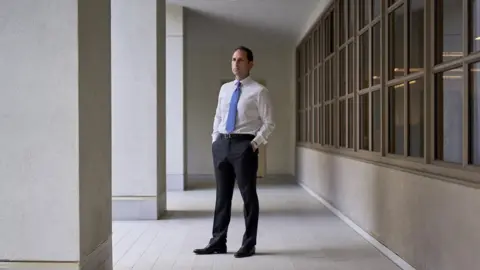Why rich convicts hire prison consultants
 Getty Images
Getty ImagesFormer Trump lawyer Michael Cohen has just turned himself in - and we may see more headline-name convicts behind bars in the near future as cases like the college admissions scandal wind through the justice system.
When the rich leave their luxury mansions for a spell in the big house, they sometimes turn to specialised consultants to cushion the blow of prison life.
Martha Stewart, Bernie Madoff, NFL players Michael Vick and Plaxico Burress, reality stars Teresa Giudice and Abby Lee Miller. They're just a few of the celebrities who have reportedly had prison consultants guide them through the justice system.
These advisers can help with the entire process from charging to sentencing to release - reviewing casework, petitioning for perks, taking midnight phone calls from frazzled families.
All this hand-holding comes with price tags ranging from a few hundred dollars to a few thousand to upwards of $100,000 (£75,000).
So what exactly do these prison coaches do when they go all-out for the clients who can afford them?

"Once you go into custody you lose control of your life," prison consultant Larry Levine tells the BBC.
"When somebody hires me, I can help them take advantage of programmes, let them know what their rights are and what they can do to regain control."
Mr Levine has been in the business for years, but he also served a decade in all manner of federal prisons across the country.
"I'm not going to tell them what should happen - I'm going to tell them what really happens and why."
Mr Levine told the BBC he has been hired by individuals involved in the college admissions scam case. Actresses Felicity Huffman and Lori Loughlin were among wealthy parents indicted for conspiring to cheat on their children's exams, or bribing coaches to provide fake athletic scholarships to elite US universities.
Mr Levine's past clients include a judge accused of stealing money and a government official caught billing her agency to line her own pockets. He estimates that currently, 75% of his clients are white collar criminals and 25% are dealing with narcotics-related charges.
But one thing is the same: "When people come to me, they're screwed. I do damage control.
"I'm like a cross between a psychologist, a marriage counsellor, a life coach and a priest."
 Larry Levine
Larry Levine
The US criminal justice system is notoriously opaque, regardless of social status.
A lot of the advising by consultants like Mr Levine for clients across the spectrum focuses on demystifying the myriad steps from the courtroom to prison cell.
Learning terminology, sequence of events, what to expect from different kinds of correctional institutions, how to get into sentence-reduction programmes.
Often, it's related to what a person can even be charged with - when it's best to accept a plea deal, or take it to trial.
Some of the consultants contacted by the BBC expressed a distrust of lawyers - a perception that attorneys often miss things, fail to explain options without jargon, or push plea agreements instead of fighting to get charges dropped.
But when it comes to wealthier clients, who are generally armed with ample legal firepower, many are looking instead for a more tailored trial experience.
Consultant Justin Paperny of White Collar Advice says the two families he is working with from the admissions scam case are looking for guidance on how to obtain the best possible sentence.
"Judges want to hear from the defendants, so we help them articulate through their own words why they're worthy of the shortest sentence," Mr Paperny tells me.
"We work with them to write their story, create sentencing videos that talk about the responsibility they accept, embracing the reality, identifying with victims."
 Boston Globe via Getty Images
Boston Globe via Getty ImagesAfter the trial is done and the sentence is passed, ensuring placement in a good prison is key, and a large part of the programmes all these consultants offer.
The Cohens and the Loughlins of the world typically end up in minimum security camps that often don't even have a full fence and are dormitory-style rather than cell blocks.
They may have to bunk with dozens of fellow inmates, but federal prison camp life is a far cry from how it is portrayed on shows such as Orange is the New Black.
That said, camp placement isn't always assured.
"Because of the 44% average overcrowding, people who are scored for a camp are going to low, medium or high security prisons," says Michael Frantz, director of Jail Time Consulting.
"They can put them anywhere, 2,000, 2,500 miles from family. In a low [security prison], there's a little bit of violence but not a whole lot.
"When you get up to a medium or high - that's where the rapes occur, the stabbings, the beatings, the games and the violence."
Mr Frantz - who spent 36 months in federal prison - helps clients petition for safe locations that allow as much freedom as possible, while also taking into account a client's personal preferences.
"If he's an exercise nut, you don't want to go to a camp that he can't exercise in," Mr Frantz says.
"If he wants to be alone and read, that's a consideration. If he wants a certain food, then we look for those kinds of camps - and they do exist."
Michael Cohen, for example, is serving his time at the Otisville camp, a facility in the upstate New York countryside known for kosher meals and Jewish services.
Reality star Mike "The Situation" Sorrentino and Billy McFarland, the man behind the Fyre Festival, are among the 113 inmates Mr Trump's former right-hand man will be bunking with.
 Getty Images
Getty ImagesThe advice for rich convicts once they're in custody is the same across the board: keep your head down and get used to not getting your way.
White-collar clients are most fearful of assault and being unable to keep in touch with family, according to consultants.
While the facilities they serve time in are generally safe, racial and political tensions are present, and there are codes of conduct to follow.
"Show the ultimate amount of respect," Mr Levine advises high-profile clients. "Don't cut in line for the telephone.
"Don't reach across somebody's food tray - I've seen people get [beaten up] for that because it's bad etiquette."
Mr Frantz cautions that in Michael Cohen's case, he should be wary of any Trump supporters he might be bunking with and try to "stay under the radar".
"The Trump lovers aren't gonna give this guy a break at all," Mr Frantz says.
"Things happen in the middle of the night - urine is poured on you, inmates hold you down and smear faeces on you. That stuff happens all the time."
And it's not just the inmates - falling afoul of prison guards can have serious consequences.
Mr Frantz served his time at a minimum security camp, but when the guards thought he misbehaved, he was still sent into a 'special housing unit' where he lived in a concrete cell with another inmate, unable to leave for 91 days.

So what exactly does it cost to have a consultant help you receive a short sentence, comfortable facility and guide you on succeeding in custody and after?
Mr Paperny says his services range from $9 (to buy his book) to $100,000 for writing books for clients, building their brand, or running their business from prison.
"It's very much business planning in addition to any of the prison work," Mr Paperny says.
 Justin Paperny
Justin PapernyMr Frantz offers similar programmes as well, including reputation repair, sentence reduction and a basic 'how to survive' federal prison course.
That course is the cheapest option at $495 (£376). Purchasing the company's exclusive package that includes all the offered programmes plus direct access to Mr Frantz himself, 24 hours a day, is a cool $35,000.
"They don't want to take chances and they have the money," he says of clients who select that option.
"They spent close to $1.5m on their attorney so what's another $35,000?"
When asked about the ethics of their work, consultants contacted by the BBC said they were doing their best to help all clients, not just the ones who can afford to pay for the full menu of services, and all engage in some pro-bono work.
Mr Levine says he'll listen to anyone's case for free to start. Mr Frantz tells me he tries to keep most courses under $2,000 and offers no-interest payment plans. Mr Paperny says his company also runs a free training scheme for prisoners in California that is paid for by the federal prison bureau.
But their fees are still far higher than what the average US inmate could ever afford.
"Yes, rates can become what some may consider expensive," Mr Paperny admits. "But frankly it's an investment."
Hiring a consultant to learn prison survival tactics alone is a waste, he adds. But for the wealthy, with businesses to run and brands to maintain?
"Our clients absolutely view it as an investment, rather than a cost."
